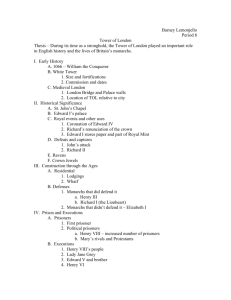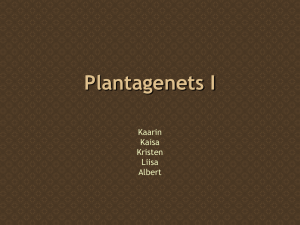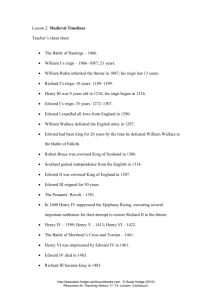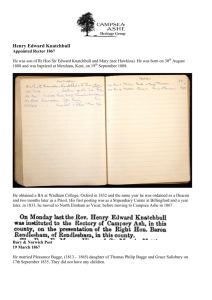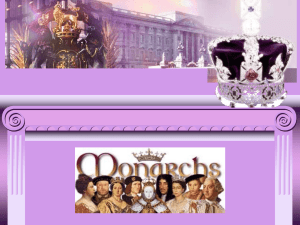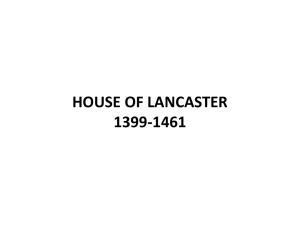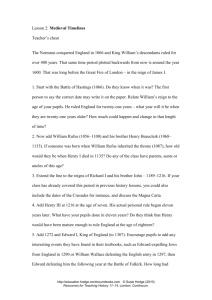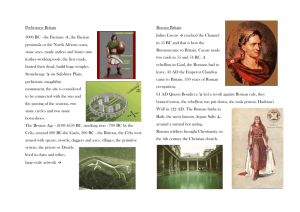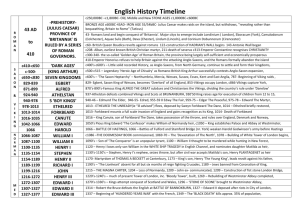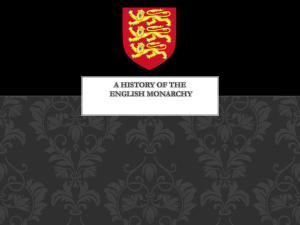PLANTAGENET KINGS 1154-1485
advertisement
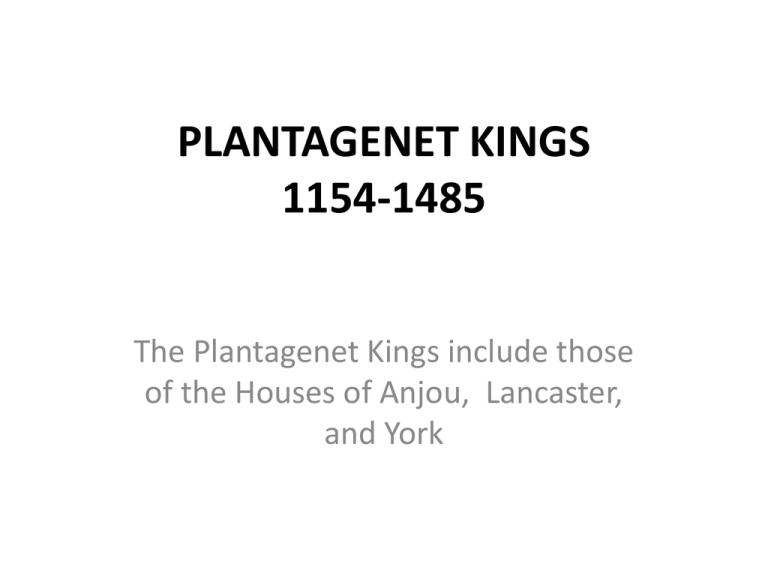
PLANTAGENET KINGS 1154-1485 The Plantagenet Kings include those of the Houses of Anjou, Lancaster, and York HOUSE OF ANJOU 1154-1399 • What were the legacies of the Angevin English monarchs? • How did the actions of the Angevin monarchs shape the development of Parliament and an English nation? • How did the actions of the Angevin monarchs impact European conflict? HENRY II (House of Anjou) r. 1154-1189 • First unopposed rise to power since 1066. • Controlled a vast empire—most of British Isles and parts of France • Married to Eleanor of Aquitaine (French) • Acquired Ireland with the help of Pope Adrian IV (the only English pope). Pope recognized his authority over • Laid down the foundations of English Common Law—consistent and accessible • Quarrel with Thomas Becket, Archbishop of Canterbury (Becket thought the Church should be independent from royal power), led to the clergyman’s murder in Canterbury Cathedral; 1170. ELEANOR • Good marriage w/ Henry II until it was soured by his promiscuity • Encouraged her sons’ rebellion against Henry II – Henry crushed the rebellion and put Eleanor under house arrest RICHARD I (THE LION HEART) r. 1189 - 1199 • Son of Henry II. Kept Henry’s empire intact • Forced his father from power with the help of French Philip II • Third Crusade – Absentee King – Known for the slaughter of 2,500 men women and children at Acre. – Captured in Germany • In his absence, legendary Robin Hood poached in Sherwood Forest. JOHN r. 1199 - 1216 • Has possibly the worst reputation of any English king • MAGNA CARTA, Runnymede 1215. – Result of disagreements with barons over taxation – Limits on royal power—subjected monarch to the law of the land. • Named king of Ireland while still prince. • Lost Normandy, Anjou and most of Aquitaine to the French king, Philip II. HENRY III r. 1216 - 1272 • • • • King at age 9; regents reestablished order for him (following father, John) Married Eleanor of Provence Magna Carta reasserted. Papal control of appointments under Henry III would set the stage for support of the English Reformation under Henry VIII. • Oversaw the rebuilding of Westminster Abbey EDWARD I (Longshanks) r. 1272 - 1307 • Son of Henry III • Surveyed the country and codified laws • Introduced the “Model Parliament” – Originally called to approve campaigns in Scotland and France • Battled William Wallace and Robert Bruce of Scotland regarding Edward’s supremacy over the Scottish king • Conquered Wales and made his eldest son the first Prince of Wales—this practice still continues today. EDWARD II r. 1307 – 1327 • Defeated by Robert the Bruce at Bannockburn – Edward should have won—outnumbered the Scots – Lead to Scottish independence • • • Parliament gained power through the Ordinances of 1311 1326- Deposed by wife Isabella (daughter of Philip IV of France), and her lover, Roger Mortimer (Edward’s political rival) 1327- Murdered in Berkeley Castle where he had been imprisoned EDWARD III r. 1327 - 1377 • Took the throne at 14 • 3 years later, he arrested his mother (now known as the “SheWolf of France”) and her lover, Roger Mortimer. • He was a legitimate rival to the French throne – The Hundred Years War begins 1337. Major victories at: Sluys (1340), Crecy (1346), Calais (1347) and Poitiers (1356) mostly because of the king’s son Edward the Black Prince. EDWARD III CONT’D • The Black Death began and ended. • All but a few towns were eventually lost to France. • He divided Parliament into two houses. • English became the official language. • John Wycliffe began his campaign. • Chaucer began his masterpieces. • In his last years, Edward experienced the loss of his loyal wife Philippa and his favorite son, the Black Prince. RICHARD II r. 1377 – 1399 (Last of the House of Anjou) • Grandson of Edward III (Son of Edward, the Black Prince) • Became king at 10 – Court controlled by his uncle; John of Gaunt, Duke of Lancaster. • Believed in his divine right and absolute power – Faced rebellions (Peasants in 1381) – Antagonized barons • While on a military campaign in Ireland, Richard’s cousin, Henry Bolingbroke seized the throne, and Richard was eventually forced to surrender to Henry. • Richard was imprisoned in the tower of London and died within a few months (by Feb. 1400).
